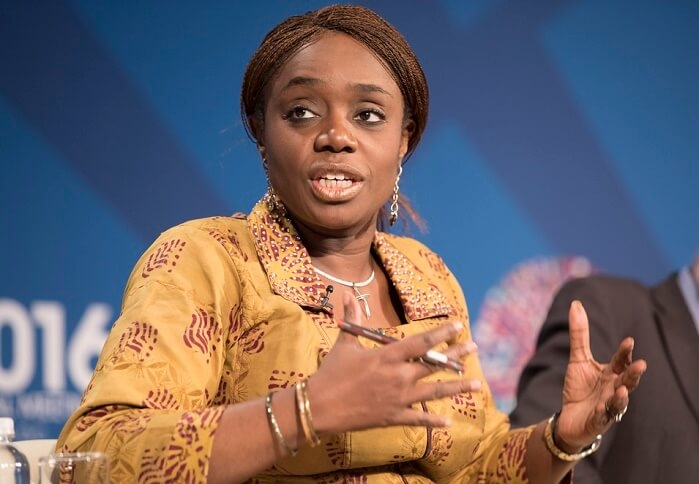 Mrs Kemi Adeosun, Nigeria’s Finance Minister[/caption]
Mrs Kemi Adeosun, Nigeria’s Finance Minister[/caption]
The Federal Government has restated its commitment to retract Nigeria’s economy from the current economic downturn by paying more attention to infrastructural projects.
The Minister of Finance, Mrs Kemi Adeosun, disclosed this on Friday during an interview with CNBC at the ongoing IMF/World Bank annual meeting in Washington DC.
Adeosun, who assured Nigerians that the economy will soon bounce back, also gave account on progress achieved so far by the Federal Government.
Advertisement
The Minister noted that the Federal Government had already achieved significant progress in its negotiation with the World Bank and the African Development Bank (AfDB) for budget support.
She said the President Muhammadu Buhari-led administration is “very much on course,” assuring that the government will achieve its economic plan within the set time frame.
“We have applied for is budget support facility from the World Bank and with the AfDB. AfDB is at the advanced stage and for the World Bank, we have submitted a letter of development policy. Hopefully we are going into negotiation as next steps here. We are therefore on course with raising the concessionary financing we wanted,” Adeosun said.
“What we have is budget support facilities, which we designed ourselves. We are on course. We are going first to domestic market , followed by the Concessionary market, then to the Eurobond market; we are very much on course.“
Advertisement
“This is being funded by a combination of our IGR and the money raised from domestic market which will be complemented with what we will raise from international market.”
“As when we started this journey, the plan was around fiscal consolidation and trying to remove the economy from consumption-driven to investment-driven. We are beginning to see the dividends in terms of reducing our recurrent expenditure, with releases into fiscal space to allow us take care of infrastructure”
“It is the key to growth and on the fact that the money was released to major projects; roads, rail, airports etc. Infrastructure will unlock the needed growth in the economy.”
“The oil price has stabilized, of course a good news in the short term and in the middle term. We expect the oil price to be stable, it is good for us, we need predictability of revenue. One of the problems we face now is that oil price is very volatile and our revenue is volatile. Predictability will enable us plan.”
“We have learnt our lessons, we have seen the oil price gone up as high as $110 in the past and the lesson we have learnt really is it is not about how high the oil price is or how low but how well we spend the money and then we have spent a lot of time to reform how we spend. In terms of our planning, we have been conservative. I believe benchmark staying well below $50 so that we are safe and we are not subject to any fluctuation in oil price.”
Advertisement
“In the past, there were joint ventures which were funded from the treasury and it is called the cash-call arrangement. We need to get out of cash calls.
“There is private money available which can be used to fund oil exploration and we have signed agreement through the NNPC with oil majors to do the modified arrangement where we borrow money from the local market, pay for further private capital and we will get oil output. More importantly for us, it releases the output because one of the challenges in Nigeria was that we were not meeting up with the cash call arrangement, we couldn’t meet our obligations and that means the quantity of oil we could have been producing, we weren’t producing it. By moving out into the private space where there is money, I don’t see any reason why we wont be able to meet our quota.”
“I think the CBN itself has said it is committed to a flexible exchange rate, we do need to make some adjustment and am confident that they will do so and it will address the shortage, but what is driving the shortage is oil price because 90 percent of our foreign exchange proceeds are from oil, so with a more sustainable oil price and getting quantity back up that’s the sort of confidence market needs.”
“Companies will come and open their factories if for example, they know that the ease of doing business, getting a company registered has become a lot easier and the Minister for Trade and Investment has made a commitment to sorting out some of those bottle necks that are actually stopping investment coming in, so we are confident that flows will come back and that will ease up the foreign exchange challenges.”
Speaking on whether Federal Reserve’s will hike rates by end of the year, Adeosun said, “I think, we looked at the market and we have got negative interest rate in Japan, a lot of pension money on a negative rate, am not sure how much the Fed will do that will harm those flows. We saw the Ghana deal, that closed four times oversubscribed. I think that’s appetite for Africa, for African investment and I think as long as we can put together a compelling macro investment story, I think there is enough money out there to meet our needs.”
Meanwhile, THE WHISTLER recalls that the Managing Director of the International Monetary Fund (IMF), Ms Christine Lagarde, announced that the IMF board had approved zero interest rates borrowing for low-income countries on all its concessional facilities until 2018.


